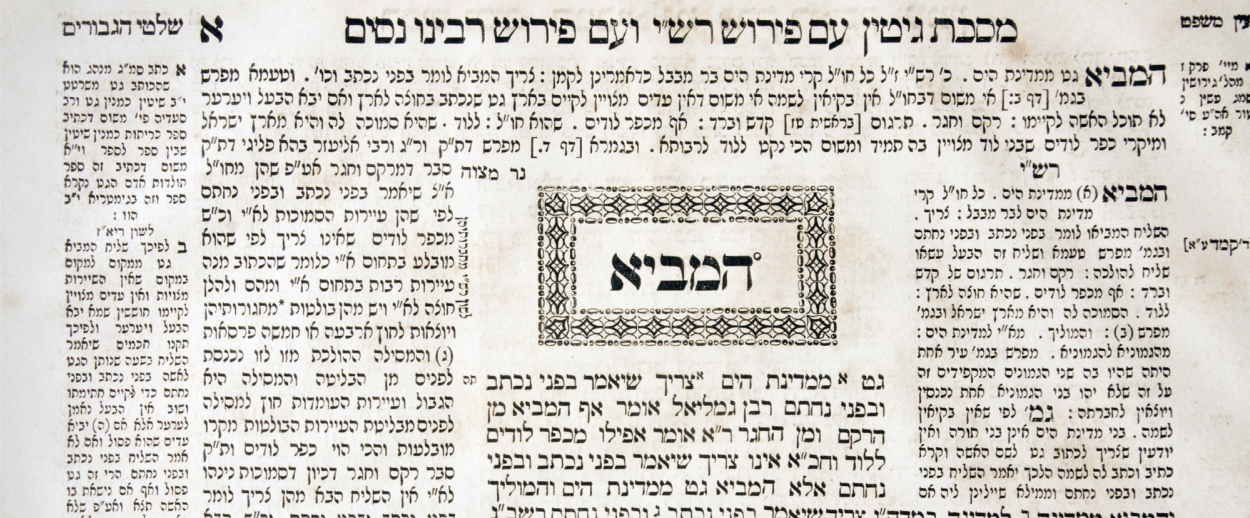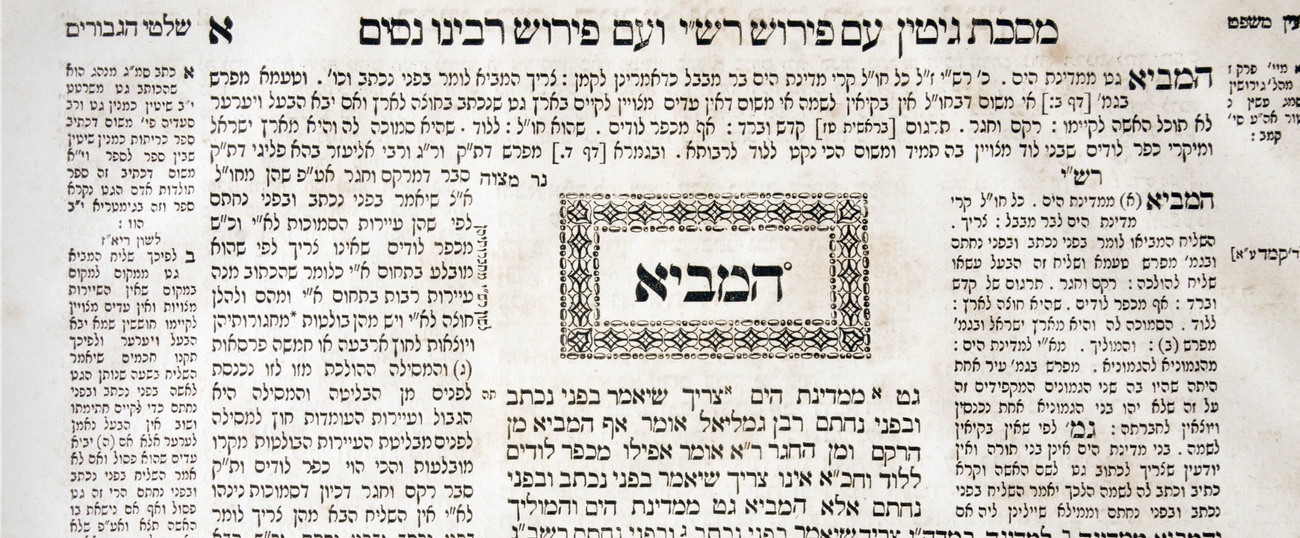Six Years of Farts, Magic, and Misogyny
Celebrating Adam Kirsch’s tour of the Talmud




What does the Talmud say about commemorating an anniversary? Something in great and elaborate detail, no doubt, perhaps touching on the necessary benedictions, fabrics considered kosher for use as tablecloth, and precautions regarding menstruating women.
Six years ago, Tablet’s Adam Kirsch began his reading of Daf Yomi, the page-a-day cycle of oral law and rabbinic exegesis that covers all 2,711 pages of the Babylonian Talmud. The current cycle is the 12th Daf Yomi. It will be completed in January 2020. The 13th begins the following day. As it never ends, we only pause here, as on the banks of a great river, to take stock.
This is more or less what Kirsch has been doing, reading this mysterious and profound and profoundly mysterious text a bit at a time, and taking stock. Once a week for these past six years, Kirsch has written a dispatch on the past seven days of text. He claims to have undertaken this in a spirit of modesty—”And I hope this column will be not anything so presumptuous as a commentary or an exegesis, but simply a record of one Jewish reader’s encounter with the Talmud”—he wrote at the beginning, even taking for himself the humble title “reader” to distinguish his own endeavor, solitary and literary, from the “learning” that goes on among Yeshiva boys.
For six years, every week, this poet, this journalist, this secular humanist literary critic has been reading and writing about the Talmud on the internet. On the internet! Who does anything for six years weekly on the internet. Modest? Who’s he kidding. But if the idea itself was sort of crazy the practice was something different. It has been modest in its directness. Not overly labored or puffed up but a series of frank, descriptive encounters with the seemingly infinite facets of Jewish life contained within the book that seems to contain everything. “Turn it and turn it, for everything is in it,” as the Mishnah says. There are the innumerable laws issued by the priests and later the rabbis and then there is the ongoing, unending argument over how to actually live by them and what it means to do so.
In his inaugural column, Kirsch explains the unique interbridged structure of the Talmud. At its center is the primary text, the oral law known as Mishnah. This is surrounded by “a much longer passage of Gemara, which is a record of discussions of the Mishnah that took place at academies in Palestine and Babylonia (today’s Iraq) from around 200 to 500 CE” And separated again by centuries as the Gemara is from the Mishnah, surrounding both “is a constellation of commentaries, the most famous of which is by the medieval French commentator Rashi.”
Already, in the first piece there is some useful, practical wisdom. The Talmud, let’s admit, is confusing and foreign to many of us raised outside of strict Jewish observance. Talmudic may be nothing more than an adjective suggesting the disputatious and convoluted. To actually approach it week after week, as Kirsch has done, and as readers have done through his column, is to find something that cannot be reduced to adjective, allusion or critical theory. It is too vast. A way of thinking rather than a set of answers. At the same time far too human, too full of the peculiar and the particular. A recurring theme in the Daf Yomi column, and one that informs the list below, is that a book dedicated to the consecration of the divine is also a litany of the Chauceresque, the ”farting, groping, deformed” as Daf Yomi editor Matthew Fishbane put it to me when I asked about his favorites from over the years.
In no particular order what follows is a sampling from the past six years of Daf Yomi selected for those columns that most reeked of life.
The Talmud as a ‘Jewish Canterbury Tales’ — A Seinfeld reference opens into a discussion of the rabbi’s thoughts on acceptable foods and matters of digestion.
Figs, on the other hand, are said to be hard to digest: Rabbi Shimon would decline a dish of figs, saying, “These do not leave the intestines at all.” Here as at many earlier points in the Talmud, we see that the rabbis placed a particular emphasis on digestion, as we see in a story about Rabbi Yehuda. A “heretic” once tried to insult him by saying, “Your face is similar either to usurers or to pig breeders.”
When Jews Were Like ISIS — Aside from the catchy title a thoughtful piece on crime, punishment and sexual double standards as prescribed by the rabbis, and on the evolution of Jewish morality.
Jewish law, far from being a dead hand, is an ongoing process of negotiation between the needs of the present and the authority of the past. And of course, this negotiation continued long after the Talmud was completed. The Talmud, for instance, takes plural marriage for granted. But around the year 1000, Rabbi Gershom, the “Light of the Exile,” made monogamy binding on Ashkenazi Jews, motivated perhaps by a desire to fit in with the Christian culture surrounding them.
A Vast Temple of the Mind — When is a law not a law? When is a wart not a wart? If I had to choose only one column, this might be it.
But why, the Gemara goes on to ask, is it the priest’s friend that must bite off his wart? Why can’t he bite it off himself? Here the rabbis give two possible answers. According to Rabbi Eliezer, biting a growth off of one’s own body is forbidden on Shabbat, so getting a friend to do it is another instance of finding an “unusual” method. But the rabbis disagree with Eliezer. They do not believe that there’s anything wrong with biting off your own wart.
The Talmud’s Mindblowing Mysticism – The secrets of creation.
These subjects, the Talmud warns, are not to be taught promiscuously; they are so profound, and so potentially disturbing, that they can only be studied under strict limits.
Not in Heaven — An examination of “man’s authority to interpret the Torah in a postmagical age.”
But even this did not convince the rabbis, and Rabbi Yehoshua responded by quoting Deuteronomy: “It is not in the heavens.” That is, the Gemara explains, “Since the Torah was already given at Mount Sinai, we do not pay attention to a Divine Voice, as you already wrote at Mount Sinai, in the Torah: ‘After a majority to incline.’ ” In other words, since the Torah itself entrusts the power of legal interpretation to the majority vote of the rabbis, even a new sign from God cannot overturn the rabbis’ authority. According to Elijah the Prophet, when Yehoshua made this argument, God “smiled and said: My children have triumphed over me; my children have triumphed over me.”
Jacob Siegel is Senior Editor of News and The Scroll, Tablet’s daily afternoon news digest, which you can subscribe to here.